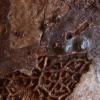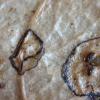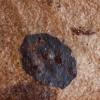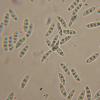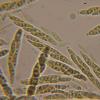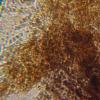
17-01-2026 19:35
Arnold BüschlenHallo, ich suche zu Cosmospora aurantiicola Lite

15-01-2026 15:55
 Lothar Krieglsteiner
Lothar Krieglsteiner
this one is especially interesting for me because

16-01-2026 00:45
Ethan CrensonHi all, On decorticated hardwood from a New York

18-01-2026 12:24
Hello.An anamorph located on the surface of a thin

08-12-2025 17:37
 Lothar Krieglsteiner
Lothar Krieglsteiner
20.6.25, on branch of Abies infected and thickened

10-01-2026 20:00
Tom SchrierHi all,We found picnidia on Protoparmeliopsis mur

13-01-2026 07:28
 Danny Newman
Danny Newman
Chlorociboria glauca on indet. decorticate logThe
Diaporthe On Leaves of Berberis
Peter Thompson,
27-05-2020 17:31
I have found two leaves of Berberis which apparantly have a Diaporthe fungus growing on them. There is no protruding ostiole, unlike with most Diaporthe species.
The spores are 1-septate, 4-guttulate, hyaline and with a small appendage ~ 0.75 um at each end. Also, they appear to be longitudinally striate and measure between 12.5 - 14.5 x 4 um.
The 8-spored ascus tips react blue to lugol.
I have attached photos of the hemispherical fruit bodies contained within a blackened area of an old leaf, which is becoming skeletal. Also two more photos showing fruit bodies within an area demarked by stromatic lines on the upper side of a less decayed leaf. On the underside of this leaf, the demarked area is blackened.
A photo of the appendaged spores is attached, along with an image of asci and spores in lugol, showing the longitudinal striations. The excipulum seems to be brown to reddish brown.
The closest species to mine, which I can find, is Diaporthe scobina, but from the sparse information which I have found, this species seems to grow on wood of Fraxinus and reacts red to lugol at the ascus tip.
I wonder if anyone has an idea as to which species mine might be?
Thank You,
With Best Wishes,
Peter.
Chris Yeates,
27-05-2020 21:00

Re : Diaporthe On Leaves of Berberis
Hello Peter
All I can say is that I have almost given up on this area - which is no use to you, I fear. In an email conversation about Diaporthales recently someone said:
"It must also be admitted that species concepts in Diaporthe/Phomopsis are completely up in the air, indications from molecular studies are that (a) the species are frequently not host-specific and (b) there are lots of them. The worst of both worlds..."
Best wishes and stay safe
Chris
Peter Thompson,
28-05-2020 17:46
Re : Diaporthe On Leaves of Berberis
Hello Chris,
Thanks for your reply.
The email which you received and quoted from perfectly illustrates the 'can't do' attitude which currently exits in British field mycology. In contrast, the professional mycologists across Continental Europe have a genuine interest in the ascomycota and species found in countries other than their own.
Still, fortunately you, me and about eight other English and Scottish field workers, spread around the country, have the commitment to do what we can with the fungal ascomycota, in spite of the British mycological shambles going on around us.
With Best Wishes,
Peter.
Thanks for your reply.
The email which you received and quoted from perfectly illustrates the 'can't do' attitude which currently exits in British field mycology. In contrast, the professional mycologists across Continental Europe have a genuine interest in the ascomycota and species found in countries other than their own.
Still, fortunately you, me and about eight other English and Scottish field workers, spread around the country, have the commitment to do what we can with the fungal ascomycota, in spite of the British mycological shambles going on around us.
With Best Wishes,
Peter.


